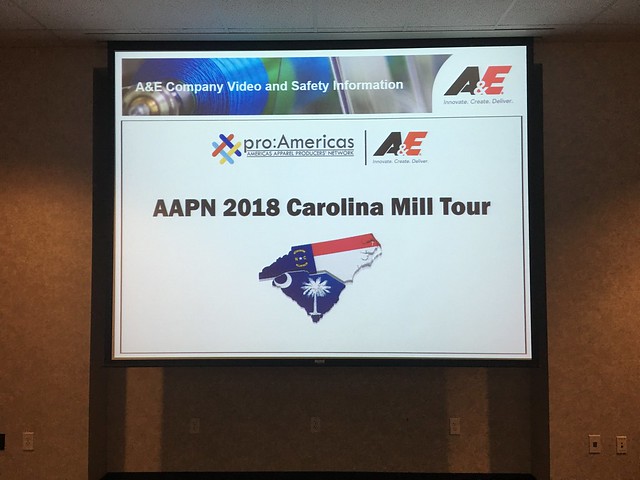AAPN Carolina Mill Tour for Brands & RetailersApril 9 - 13 | Unifi, Contempora Fabrics, Carolina Cotton Works, Parkdale Mills & American & Efird During the week of April 9-13, 2018, the Americas Apparel Producers’ Network (AAPN) conducted its first ever Carolina Mill Tour. AAPN has always been a place where small groups could act quickly. This tour is a perfect example as it was the idea of Contempora Fabrics’ President and AAPN Board member Ron Roach who invested months of planning with AAPN Executive Director Sue Strickland, Managing Director Mike Todaro and several other AAPN members to make it happen. Participants visited Unifi Inc., Greensboro, N.C.; Contempora Fabrics, Lumberton, N.C.; Carolina Cotton Works and Parkdale Mills both located in Gaffney, S.C.; and closed the tour with a stop at American & Efird, Mount Holly, N.C. The tour included 23 executives, managers and staff from Academy Sports & Outdoors, Columbia Sportswear Co., Full Beauty Brands, Haggar Clothing Co., Lacoste, Patagonia, Superior Uniform Group, Target and VF Corp. Comments from tour participants included: “We loved it! It was an awesome learning opportunity that we could have without spending the money of going to Asia! Beneficial for all. Great idea — thanks for making it happen!” “I was blown away. It was nothing like I expected when I walked in the door. I wasn’t expecting all of the automation. It was just amazing. And the cleanliness — everything just seemed so perfect.” “I think Parkdale is the Tesla of yarn spinning. They are so automated – and clean. When I talked with my manager about this trip, he said, ‘you’re going to visit textile mills. Don’t wear your nice shoes. Wear some old shoes that you can throw away because it’s going to be dirty.’ And I was really, really surprised.” “It’s been a great opportunity on a couple of different fronts. One of them is the amount of information we’re getting. When you’re working with these vendors from your desk, the mechanics of how these things get made is still an abstract concept. But being able to come here and seeing the machinery and the people behind it, that makes a big difference. The other part is the kind of face-to-face relationships we’re building, not just with these companies but also with these other retailers and brands from all around the country. You start talking to them and you realize that we all have the same challenges.” “The ability to network with individuals from throughout the industry was been good. It’s a very non-competitive thing. We talk about the same challenges that we all have in our businesses that we can collectively work on and fix. So there were ideas that I have heard for different issues that are going on.” “I love it, I love it, I love it! I cannot say enough about this. This is an incredible experience. I wish they were doing things like this when I was in school. To be able to see everything you talk about is wonderful. It’s good to meet these folks and to hear their perspective. It’s completely eye opening.” “We have mills in the States that are capable of producing serious amounts of fabric for us, which will allow us to eliminate some of these turn times. Customers want things now and fast turn times are required, so we have options here. And I love the fact that these companies we’re visiting are sustainably sourcing their raw materials and producing their goods. Plus, these plants are immaculately clean. And I was really surprised at how automated these plants are, too.” “It’s been a great visit at every stop. It’s great to see the industry alive and well and vibrant and growing. It’s good to see these people get exposed to it. They don’t know how yarn or fabric is made. The U.S. is a great place to manufacture things. It’s reliable, and that means a lot, too. Reliability will generate speed. I think it’s a huge advantage, and more people need to know it’s here.” “Wow! I’m not normally speechless but I’m close to it this week. Technology and automation, efficiency and cleanliness are all alive and well in U.S. manufacturing but I have to say the most impressive thing about the week was the people. Passionate, knowledgeable, open-minded, flexible, caring and extremely hard-working people. Every facility we visited was growing, already running three shifts nearly every day of the year, and struggling to recruit.” The single objective of this tour was to educate brands and retailers on steps in the production of a garment starting at fiber, then yarn, knitting and finishing focused on the United States, the Carolinas, the supply chain as well as innovations, investment, jobs, networking and more. To AAPN, it is as though an event like this has been in the making for years. It built on AAPN’s annual conferences, leadership forums, sourcing executive roundtables, regional conferences, regional summits, foreign delegations, the Carolinas solo tour; and even supply chain meetings hosted by AAPN factory members. At every stop, we were met by the company’s CEO and staff. We worked most closely with Ron Roach at Contempora. Now we can apply this format to future tours. In fact, as Roach said after the event: “There are really two different educations — education on the details as to how things are made and education on how things get done. My focus was always on how things get made with the goal in mind of teaching, but certainly in all of this is the bigger picture of trust, speed, and ownership. Really nothing happens unless all three are present”. PHOTO ALBUM |


